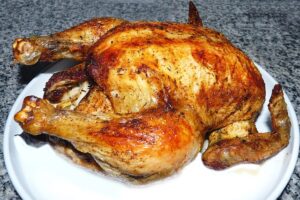Introduction
When it comes to sausages, bratwurst is a popular choice for many meat lovers. But if you’re watching your protein intake, you may be wondering how much protein is in a bratwurst. In this article, we will delve into the nutritional content of bratwurst and provide you with the information you need to make informed dietary choices.
Nutritional Content of Bratwurst
Bratwurst is a type of German sausage made from pork, beef, or veal. The exact nutritional content of bratwurst can vary depending on the specific ingredients and preparation methods used. However, in general, bratwurst is a good source of protein.
A typical serving size of bratwurst is one link, which is approximately 85 grams (3 ounces). This serving size contains around 14 grams of protein. Protein is an essential macronutrient that plays a crucial role in building and repairing tissues, supporting immune function, and providing energy.
In addition to protein, bratwurst also contains fat and calories. The fat content can vary depending on the type of meat used and any added ingredients. On average, one link of bratwurst contains around 20 grams of fat and approximately 250 calories. It’s important to note that the fat content in bratwurst is often higher than the protein content.
Protein Quality in Bratwurst
Protein quality is an important factor to consider when evaluating the nutritional value of a food. The quality of protein is determined by its amino acid composition and how well it meets the body’s needs.
Bratwurst is considered a complete protein source, meaning it contains all nine essential amino acids that the body cannot produce on its own. These essential amino acids are necessary for various bodily functions, such as muscle growth and repair.
However, it’s worth noting that bratwurst is also high in saturated fat, which is linked to an increased risk of heart disease. Therefore, it’s important to consume bratwurst in moderation as part of a balanced diet.
Other Nutrients in Bratwurst
In addition to protein, bratwurst provides other essential nutrients. It is a good source of vitamins and minerals, including vitamin B12, zinc, selenium, and iron.
Vitamin B12 is essential for maintaining healthy nerve cells and red blood cells, while zinc and selenium play important roles in immune function and antioxidant defense. Iron is necessary for the production of red blood cells and oxygen transport throughout the body.
However, it’s important to note that bratwurst is also high in sodium, which can contribute to high blood pressure in some individuals. If you have hypertension or are watching your sodium intake, it’s advisable to consume bratwurst in moderation or choose lower-sodium alternatives.
Conclusion
Bratwurst is a flavorful sausage that can be enjoyed as part of a balanced diet. It is a good source of protein, providing around 14 grams per serving. However, it’s important to consume bratwurst in moderation due to its high fat and sodium content. As with any food, it’s best to incorporate bratwurst into a varied and balanced diet to ensure you meet your nutritional needs.
References
– USDA FoodData Central: https://fdc.nal.usda.gov/
– Nutritionix: https://www.nutritionix.com/











